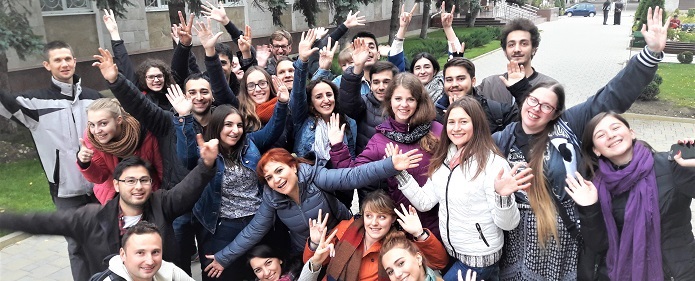
Sparking a love of heritage in Moldova – discover how Heritage Hunters aims to encourage young people to engage with culture.
Traditional jobs and crafts, art, music, language, food, even the way we dress - cultural heritage can mean many different things to many different people.
Mention those words to young people though, especially in the United Kingdom, and often the image conjured is one of dimly lit museums and galleries which offer little of interest for them.
City Arts Nottingham, however, is on a mission to make youngsters much more aware of their culture and history after taking part in the ‘Heritage Hunters’ project, funded by Erasmus+.
The project saw 29 youth leaders from partner organisations in Denmark, Armenia, Romania, Turkey, Moldova, Azerbaijan and Ukraine coming together for a study visit to Moldova in November 2017. Meridith Dickin and Mary Strickson, members of City Arts Nottingham’s Young Producers group, travelled to represent the UK.
This trip was followed up earlier this year by a week-long seminar in Nottingham, and the creation of a booklet of strategies, procedures and methods for engaging youth in culture.
Project co-ordinator Alma Solarte-Tobon says: “In Britain, young people have less understanding of what heritage is. We wanted to learn from our EU partners, to see how they promoted heritage within their countries.”
Engaging with culture
After gaining independence in 1991, Moldova has focused on retaining and reviving its national heritage, which is a key reason why it was chosen for the study visit. 
Alma explains: “Moldova is a fascinating country, in terms of being a fairly new republic. The visit showed the stages they’re at in becoming a republic, trying to understand their heritage and how that fits in.”
During the visit, the group explored the capital city of Chisinau and the towns of Bahrinesti, Orhei and more - learning about, and often trying, traditional Moldovan arts and crafts as well as sharing ideas with fellow participants and boosting their own communication skills and confidence.
Keeping cultural heritage alive
Alma explains that, as part of the experience, the participants needed to “create ideas for projects based on what they had seen and learned from each other, working with people from other countries to plan activities that could possibly engage young people in arts, culture and heritage."
 This was developed further in April during the seminar in Nottingham, with different delegates attending from the same partnership countries.
This was developed further in April during the seminar in Nottingham, with different delegates attending from the same partnership countries.
"We invited organisations that City Arts works with and shared best practice of how they engage young people and the community in local heritage,” says Alma. “All the delegates also exchanged ideas and perceptions on how we should engage young people in culture and heritage. For example, how to engage someone in a museum, how would you engage someone in a traditional, cultural experience."
These methodologies, procedures and policies have been brought together in a booklet, which the City Arts Nottingham hopes will help youth groups with similar ambitions.
We need to work together, to share experiences, heritage and culture. To share our ideas, our knowledge and our beliefs to gain wider understanding and acceptance.
While it is hoped the booklet will have wide impact, the project has already made its mark. In June the Nottingham UNESCO City of Literature team presented ‘Heritage Hunters’ as an exemplary case study for engaging young people in arts, culture and heritage at the UNESCO Summit in Krakow, Poland.
Meanwhile, for the participants the experiences of the Moldova visit live on and have expanded horizons.
Meridith says: “What do I engage with from my own heritage? This whole trip made me question that, and inspired me to see how I could help other young people explore what heritage means to them.”
“The most important thing this trip taught us is that we should all be international and connected,” adds Mary. “We need to work together, to share experiences, heritage and culture. To share our ideas, our knowledge and our beliefs to gain wider understanding and acceptance.”
